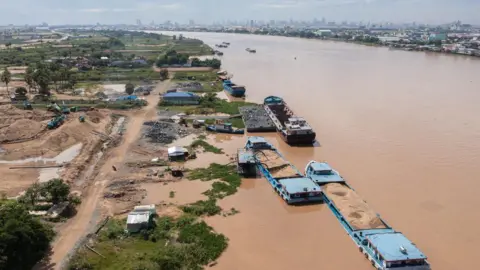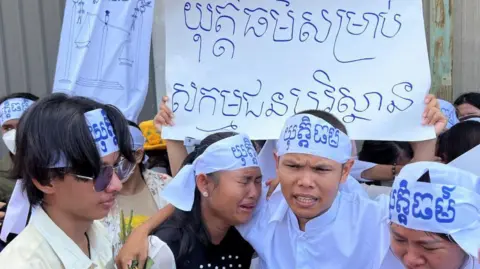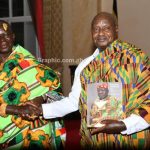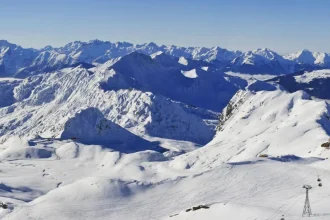Cambodia has jailed 10 environmental activists who had sounded the alarm on river pollution for plotting against the government – a case critics have decried as politically motivated.
Members of the group Mother Nature were charged in 2021 after they documented waste run-off into Phnom Penh’s Tonle Sap River, near the royal palace.
Three of them, including Spanish co-founder Alejandro Gonzalez-Davidson, who was also convicted of insulting the king, were sentenced to eight years jail and fined $2,500 (£1,980). The seven others were handed six-year terms.
Prosecutors have never explained how the activists had violated the law against insulting the king or conspiring against the government.
Since its founding in 2013, Mother Nature has campaigned against environmentally destructive projects and raised questions on how natural resources are managed in the South East Asian country.
They document their findings in playful and informative videos that they post on Facebook, where they have 457,000 followers.
Environmental groups have long accused Cambodia’s leaders of profiting from the country’s natural resources. The government denies this and says Mother Nature is encouraging social unrest.
Gonzalez-Davidson, who was earlier banned from entering Cambodia, called the verdict a “disastrous decision by the Hun family regime”.
“No one benefits from [it], let alone the government. As we have seen with previous cases like this, this tends to send people into shock for a while, but ultimately backfires because it inspires many others to take [the jailed activists’] place,” he told the BBC.
Can the once-mighty river be saved?
Cambodia’s law against insulting the king is relatively new and took effect only in 2018. Critics say it is being used to crack down on dissent.
Opposition political parties were dismantled, independent media outlets were shut and dozens of activists were jailed under the decades-long rule of former prime minister Hun Sen, who stepped down last year to pave the way for his son, Hun Manet, to assume leadership.
Under Hun Manet, Mother Nature activists have continued to criticise what they describe as an unequal enforcement of laws in favour of companies and the wealthy elite.
Four of the convicted activists attended the hearings and were immediately arrested following the verdict.
Representatives of local NGO the Cambodian League for the Promotion and Defence of Human Rights (Licadho) who were present outside the Phnom Penh court said the arrests were violent, with “at least two of [them] dragged by their necks”.
Arrest warrants have been issued for the six others, including Gonzalez-Davidson.
Earlier in the day, dozens of Mother Nature supporters marched towards the court where the activists were due to receive the verdict.
Dressed in white – the traditional colour of mourning in the country – some of the supporters held up hand-written posters that read “We need freedom” and “We need rights”. Others held white flowers.
 BBC/Thomas Cristofoletti
BBC/Thomas CristofolettiRights groups have denounced the verdict as a blow to Cambodia’s diminishing civil society and environmental movement.
The verdict “sends an appalling message to Cambodia’s youth that the government will side with special interests over the environment every chance it gets,” said Human Rights Watch’s deputy Asia director Bryony Lau.
“It is astounding to criminalise activities of youths who are advocating for clean water in Phnom Penh, protecting mangrove forests in Koh Kong and warning against the privatisation of land in protected areas and characterising it as an attack against the state,” said Licadho’s outreach director Naly Pilorge.
However, he is hopeful that the activists’ efforts “will still inspire other human rights defenders to join the front lines and continue to push for a more democratic Cambodia”.
Several of those convicted today had already served jail terms in the past. One of them, Long Kunthea, told BBC in an interview last year that she is willing to take on the risks of her activism to “for positive change”.
Kunthea was previously jailed for more than a year for organising protests to protect the Mekong river from further pollution.
“This problem on the Mekong is a problem for all of us… I don’t want to see this continue to happen to Cambodia, to Cambodian people, and to our next generation ever again,” she told the BBC.
One of Mother Nature’s successful campaigns, which Mr Pilorge made reference to, resulted in officials ending the export of sand from the coastal estuaries of southwestern Koh Kong province, which was destroying the local ecosystem and fishing grounds.
They also successfully halted the plan to build a hydro-dam in the Cardamom Mountains. The China-led construction project would have threatened the livelihoods of indigenous communities in the area, the group had said.
Last September, the group received the Sweden-headquartered Right Livelihood Award for its “fearless activism”. “[Mother Nature] has emerged as a beacon of hope for future generations, fighting for the preservation of nature and human rights in Cambodia,” the jury of the annual award said at the time.















